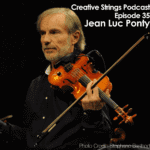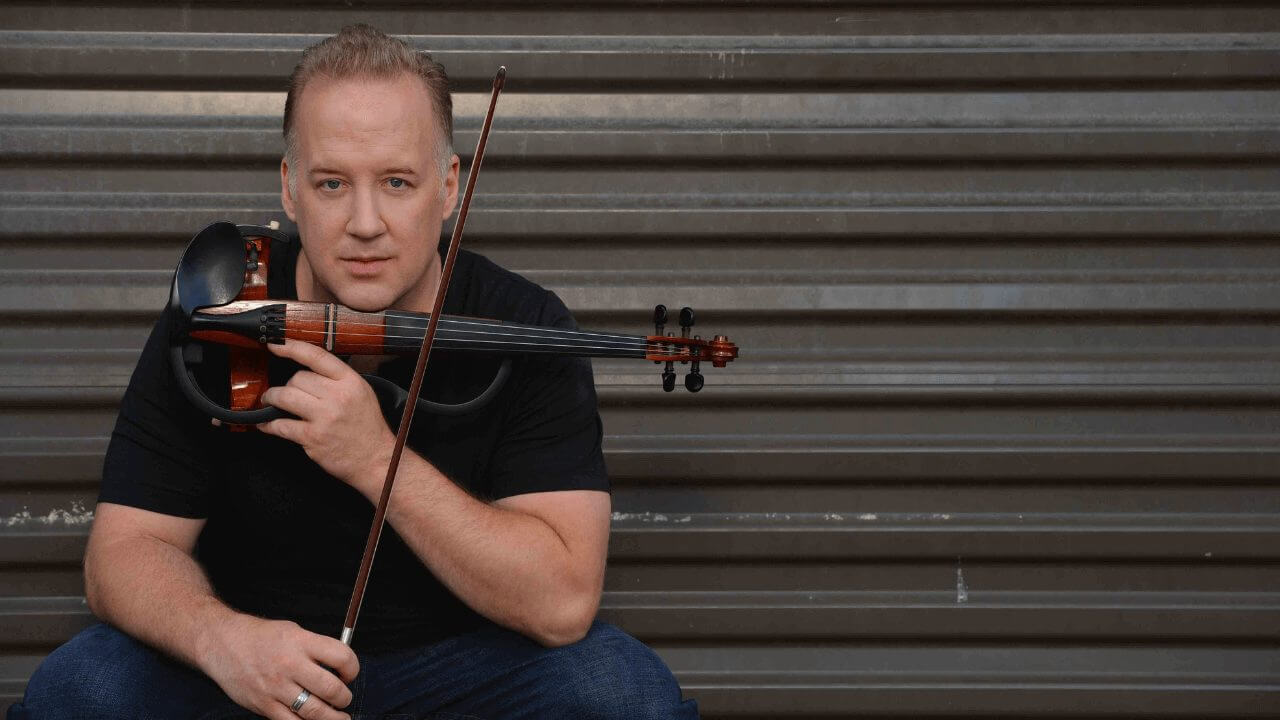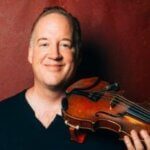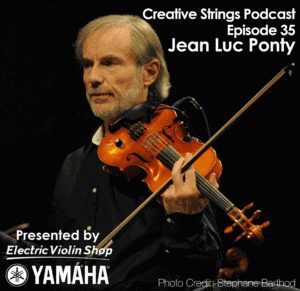
Jean-Luc Ponty is one of the most respected violinists in any genre
and one of the first to adapt violin to modern jazz.
Table of Contents
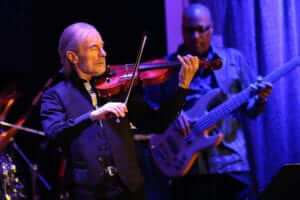
As it turns out, he is also a humble spirit, generous with his knowledge, his experience, and his time.
There are few greater privileges than learning about an art form directly from one of its greatest living exponents.
In our conversation, I had the opportunity to pick the brain of this giant figure. Together, we explore key points in his development, musical conception, violin playing, views on the state of the music industry in general, and more.
He speaks eloquently, articulately and thoughtfully on so many topics. I learned a lot, and hope you will too. Click below to listen.
Jean Luc Ponty tells how to balance creative improvisation, composition, and contemporary styles within a classical training.
If you are a string player who would like to further your training in these areas, consider:
Subscribing to the online Creative Strings Academy
Check out our current Creative Strings Workshop offerings
Key topics we covered in the interview:
2:17- Jean Luc Ponty’s early development in jazz, and how he started playing violin
6:53- His first experiences with modern jazz and influences from different instrumentalists
8:43- Differences between European and American jazz traditions
10:50- The influence of Stuff Smith
15:40- The influence of classical technique on his jazz playing
18:00- One possible explanation of why Ponty was so interested in improvisation as a young man
19:15- The role of the bow arm in improvisation
23:13- More on the influence of other instruments on his violin playing, and the relationship between his personality and musicality
25:00- Recap of Ponty’s personal development, and his switch from straight-ahead jazz to jazz-rock
27:22- His work with Frank Zappa
33:53- His current level of engagement with straight-ahead jazz
35:55- Broader implications of being both a composer and an improviser
37:55- On finding your own voice/Tigran Hamasyan
42:10- Changes in the views on improvisation in the world of classical violin over time
49:10- Ponty’s views on classical music
51:45- Changing attitudes about touring and music as a career
56:00- Ways in which the music business has changed
1:00:00- Differences between working and living in America and Europe
Quotes from my interview with Jean Luc Ponty:
“I would start playing vinyl records as soon as I would drink coffee in the morning, and then try to jam with those, and then at night go jam in jazz clubs, because at the time there were several jazz clubs in Paris…”
“…As much as I admired [Stéphane] Grappelli, he was not really a bebop or modern player, and therefore I had no example from any violinist.”
“… when I discovered Stuff Smith, [he] really spoke to me…in other words, adapting the violin to jazz, as opposed to the other way around…Although, again, I could not copy exactly what he was doing, because I was mostly listening to Miles [Davis] and [John] Coltrane, but I guess it inspired me and encouraged me to go that route of definitely forgetting about the traditional techniques on the violin and just adapting the instrument to what was needed to play jazz.”
“You know maybe one of the clues…why I was so attracted by jazz and improvisation is in fact, my early goal in life was to become a composer and conductor.”
“Violin was not my main passion, it was music in general.”
“In my mind, when I was playing, at the beginning…I was thinking I was a trumpet player, I was imitating a trumpet on my violin, and that’s why I was trying to hear that straight sound without vibrato, like Miles [Davis] for instance, or [John] Coltrane.”
“I said, ‘that’s it, I should just write my own music, and whatever style that’s going to be is going to define my music.’ That’s it. Suddenly, it helped me to get rid of that tradition that felt heavy on my shoulders.”
“Critics started to call this music jazz-rock in the late 60’s and early 70’s…what that did to me is to be able to write a piece that was a bit similar to structures in classical music, like a concerto…longer pieces than just a five minute song that was used in more popular music in those days. So, I felt liberated and able to use my skills as a composer thanks to this combination of jazz, rock, and other elements.”
“I can see that the young generation of classical players are a lot more open and interested by modern styles of music, some of them all the way to wanting to learn how to play jazz.”
“You are not going to become a jazz violinist in three days, but think of Mozart or Bach, and take a simple triad or chord and see what notes or scale will fit on that.”
“I like to encourage people to improvise, and it doesn’t necessarily have to be jazz.”
“Going on the road, you’re right, it becomes kind of grueling after all these years…what keeps me going is it’s such an interesting experience to share your vibrations with an audience.”
“After touring for five years, I took a one year sabbatical, no gigs, not a single concert, to be home with my children and my wife…it’s a choice.”
Thanks to our sponsors Yamaha and Electric Violin Shop. Their support makes it possible to invest in the production of each episode and bring you great stories like this interview with Jean Luc Ponty.
Subscribe to get all episodes by clicking the icons below

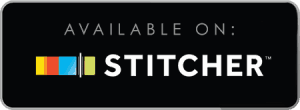

While you are talking to EVS, be sure to ask them about the new Yamaha Electric Violin (you can check out my video review here). I’ve been a Yamaha performing artist for over 20 years and am very proud to be a part of the Yamaha family.
Learn more about Jazz Violinist Jean Luc Ponty:
-his official website
– on Wikipedia
Are you a string player/teacher interested in exploring improvisation, contemporary styles, and related subjects?
Take a free introductory private Skype lesson (limited avails)
Attend an upcoming workshop
If you enjoyed my interview with Jean Luc Ponty, check out these related posts:
Full Interview with Jazz Violinist Regina Carter
